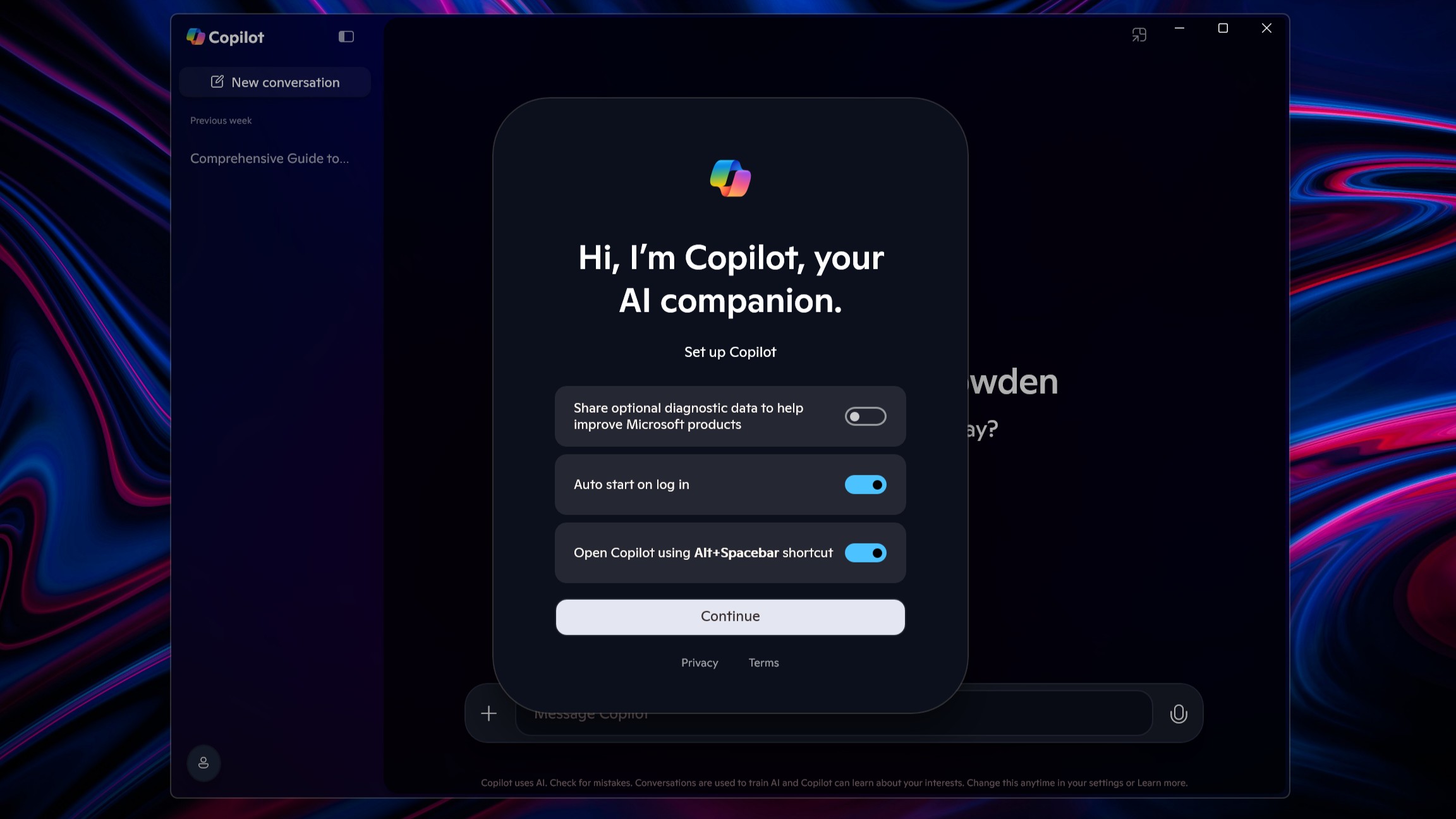Review: Treo 800W
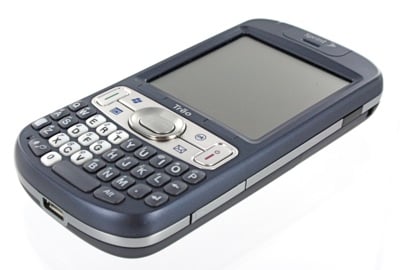

Palm and Sprint have finally announced the Treo 800w, nearly two years after their last CDMA Windows Mobile Treo, the 700wx. At long last, we have a Treo with WiFi and GPS. Does Palm have a winner here? So far we have to say we're very impressed with the 800w's performance and (still) underwhelmed with the looks.
There's a lot more to say, of course, so read on for our full review and unboxing video first look!
(Cross-posted at TreoCentral)
The Treo 800w is a long-awaited update to the Treo 700wx and many, of not most, have thought that the wait for the device has been too long. In that long period, Palm hasn't created anything that will knock your socks off on a first impression. Spec-wise, there's nothing to complain about here -- if I had a list of everything I expect on a CDMA Windows Mobile device, the 800w matches pretty much all of them. Were it released a year ago, it would be the undisputed king of Windows Mobile Pro devices. The Treo 800w sells for $249.99 after a 2-year contract. Released today, it holds a deserved place at the top of the CDMA heap, but devices that will one-up it are on the horizon.
As you've seen here and elsewhere, the looks of the 800w are somewhat ...underwhelming. It's a very straightforward device that matches the classic Treo form-factor (minus the antenna) -- though I will say right now that it very nearly perfects it. I am now and may always be a believer in the core design idea of the Treo: a great, front-facing QWERTY keyboard that can be used one-handed combined with a touch screen. There's nothing available (at the present moment, in the US) to match it, but Palm still manages to improve on that basic design idea with every iteration.
The Treo 800w's dimensions are 4.41“ x 2.28” x .73“ -- and the reduced width and thickness really do make a difference. It's not as curved on the back of the device as the Treo 750 but it still feels very good in the hand. Overall, the 800w feels like it's just at the cusp of being too small (in the width department) for serious use.
The Blue color looks pretty decent (though we'd still prefer a black or grey version) and the 800w also thankfully eschews the latest fingerprint-friendly trend of glossy finishes for the classic soft-touch paint.
Get the Windows Central Newsletter
All the latest news, reviews, and guides for Windows and Xbox diehards.
It weighs exactly 5 ounces with the battery and has both a nice heft and a good balance to it -- overall my only complaints about the look and feel of the device are it's conservative styling and its thickness. I can guess why Palm decided to stick with the recessed screen (it makes a certain class of customer feel less worried about scratching the screen), but I don't agree with the decision.
Around the Device
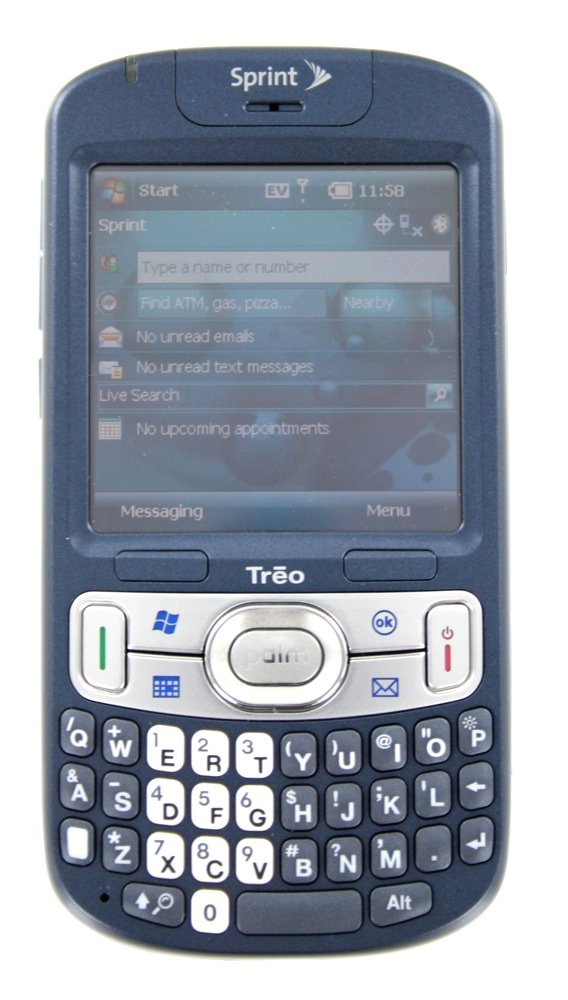
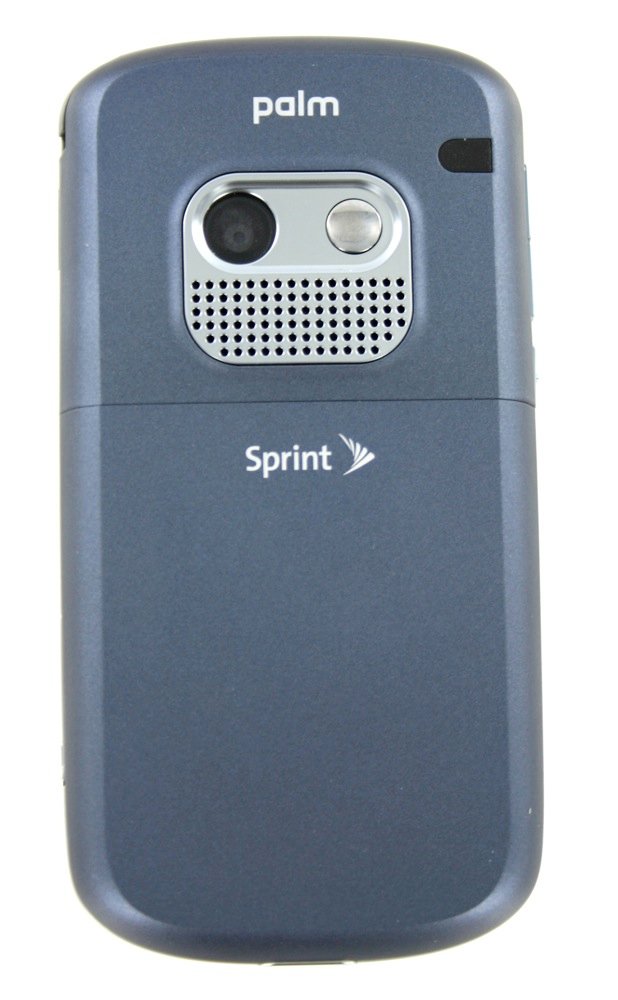
The front of the Treo sports its recessed 320x320 screen (it's great, more on that below), the QWERTY keyboard, a LED, the 5-way dpad, 2 soft-buttons, and 6 buttons. In other words, it has 2 more front-facing buttons than the 700wx and they're a welcome addition. The soft buttons are somewhat odd-looking integrated into the casing, but that's a tiny gripe to be rolled into the overall gripe that though the 800w has great specs, it lacks anything approaching sex-appeal.
In any case, the buttons are not mushy or clacky, they act and feel just as you'd like buttons to act and feel. There may be one caveat for 700wx owners to that, however, as the 800w now matches the behavior of nearly every other Windows Mobile device out there when it comes to the red End key. Hitting that while in an app will take you back to the Today screen, hitting it again will power the screen off. Like with the 750, however, you can work around that by hitting Opt-End to activate the keyguard and power down the screen without losing your place.
The back is a little curved at the edges but almost entirely flat. You remove the battery door by just pushing down, but it seems to hold on well. It's easier to remove than the Centro battery door but doesn't feel like it'll get flimsy anytime soon. You've also got your speaker grille here (it's plenty loud) and your 2.0 megapixel camera with requisite self-portrait mirror. Unfortunately, Palm did not take the lesson they learned from the Centro and left the speaker to sit precisely flush with the table, slightly muffling the sound.

On the right side we have an IR port -- let's hope that Palm didn't expend too many resources keeping that out-dated tech in the device. You'll also find a slot for a microSD card. The door covering the slot feels relatively sturdy and shouldn't break or fall off on you (hi there, Motorola Q9h!). I'll note here that the 800w read my 8gig microSDHC card with no problems, in fact it was very fast.
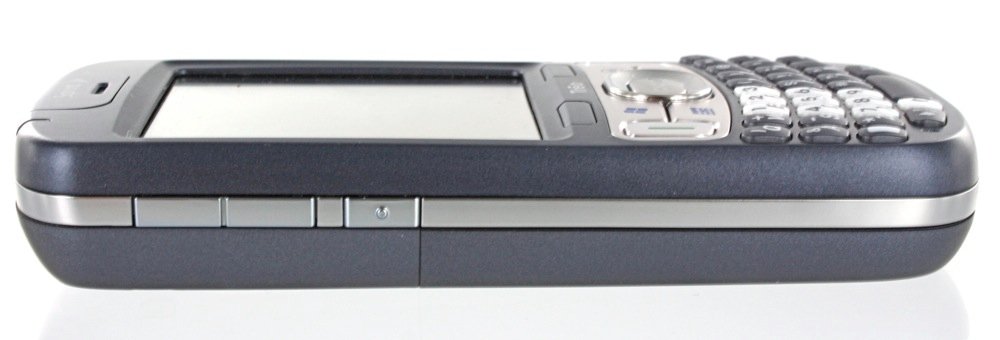
On the left side you've got your volume buttons and the traditional Treo side button. Palm has stuck with the nigh-inexplicable behavior of having the side button do nothing on a single press, requiring instead you hold it down to activate anything. Since the Treo 800w doesn't support Push-to-Talk, it would have been nice if Palm had allowed both single presses and long presses to initiate actions.
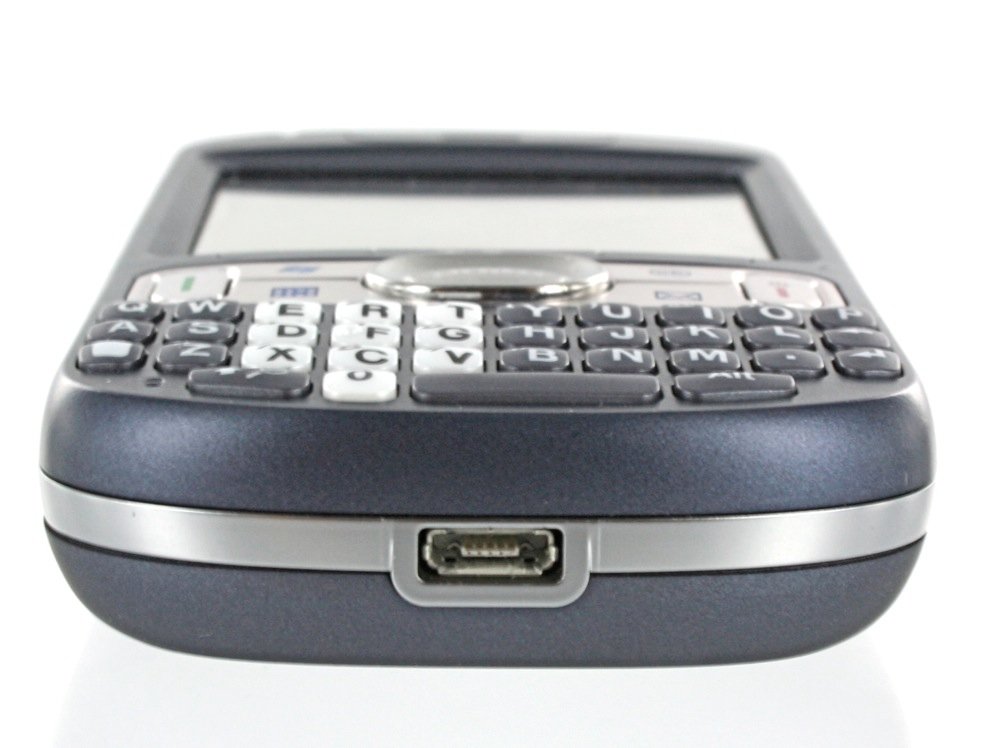
On the bottom you've got a microUSB port and that's it. No hated 2.5 headset jack, but also no 3.5 headset jack either. Like with HTC devices, you'll need to either use the included stereo headsets or get yourself an adapter. I greet this change with mixed feelings, but mostly good ones. The classic Treo ”Athena“ connector is better dubbed ”Anathema,“ good riddance to bad rubbish. As for using microUSB instead of standard USB, I've got no bones to pick with that.
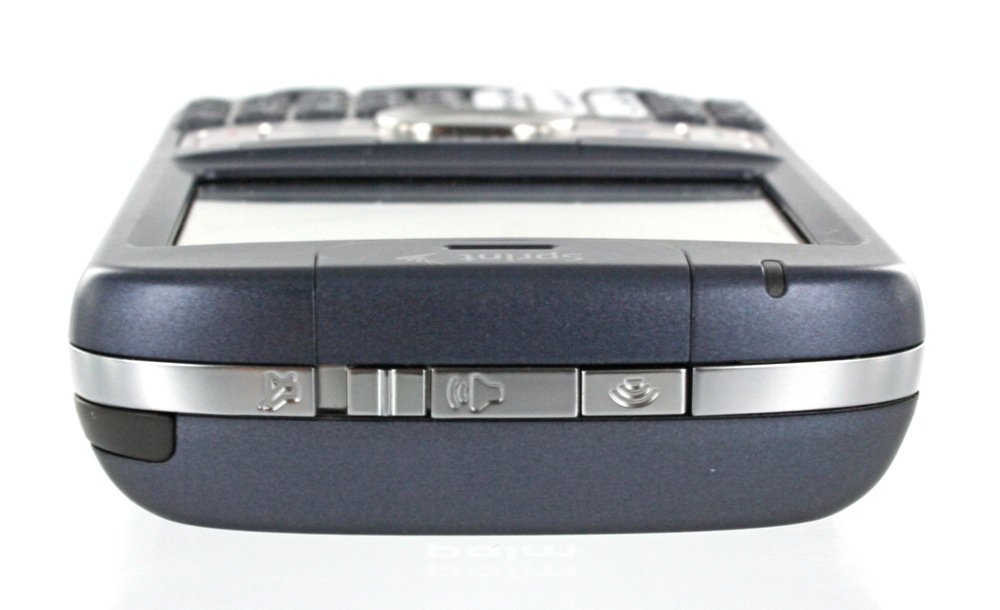
And finally we have the top of the device featuring the silence switch. I'll point out to my iPhone using friends (and, yes, my own alter ego) that this is a proper ringer switch, not the bollocks that you'll find on the iPhone. When you enable the ringer switch on a Treo, the external speaker is silent, period, whether you're getting an SMS or playing a game or having an alarm go off. That's how it's supposed to be, folks, and that's how it works on the 800w. Next to the ringer switch is the WiFi toggle button, more on that below.
...This is as good a place as any to tell you that in the box comes the 800w, a single battery, a wall charger, a microUSB cable, a set of stereo headphones that plug into that microUSB port, and a cd plus various manuals.
Keyboard
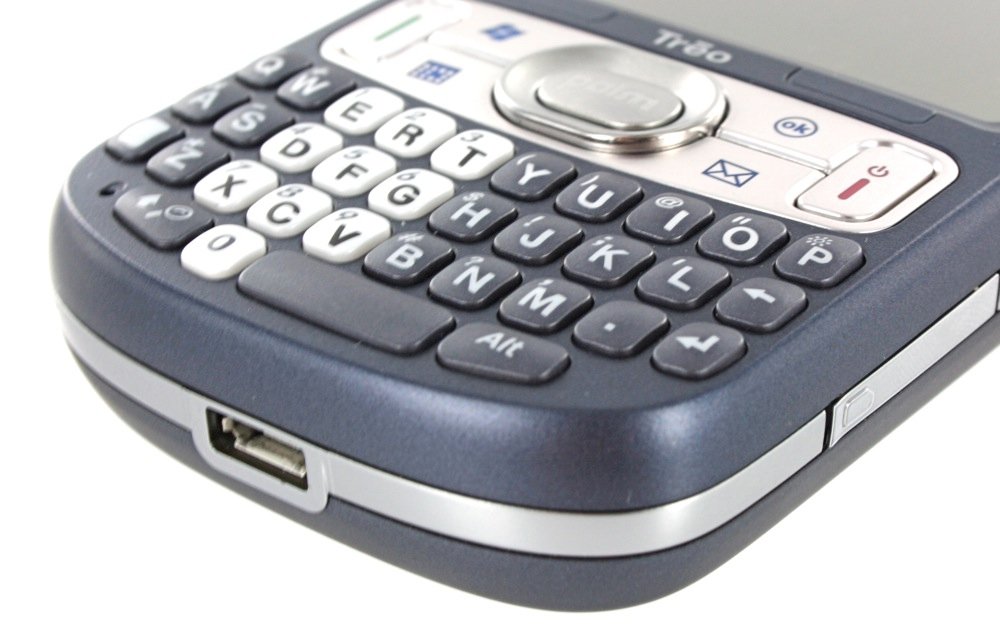
Keyboards on Treos are always good, and the 800w is no exception. Though it's not as wide as its predecessors, the keys are still well-separated and easy to type with. For those who are hardcore about their Treo keyboards, I'll note that the 800w still features the incredibly subtle but still nice feel of the traditional Treo key. By that I mean that the oval/dome top of the key is ever-so-slightly higher on the upper-left of the key.
Some might mourn the loss of a 2nd shift key, but I do not. It had to go to make the keyboard fit the new, less-wide form factor. In any case, the bottom line here is that they keyboard is excellent -- the best I've used on a Windows Mobile Pro device since the Treo 700wx. More importantly, it's excellent for one-handed use.
Screen
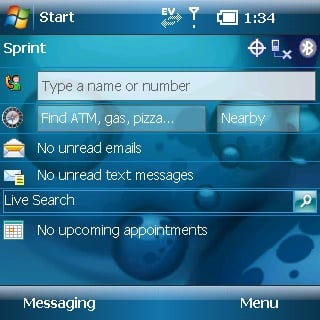
The screen is great. It's 320x320 resolution in a space that's slightly smaller than the original 700wx's screen. Comparing it to the 700wx's 240x240 screen makes you realize just how much you've been suffering all this time. Comparing it to larger screens (like that on the Mogul) that are 240x320, those extra pixels really do make a difference. There's nothing else out (in the US, as of this writing) that's 320x320 and though I'd like to see Palm shouting that from the rooftops, with the coming higher-resolution devices I can see why they might not.
Still, the screen looks great and is responsive to touching. I do wish it weren't recessed (yes, I said that above. It bears repeating), it it makes it a very tough to get those corners and scrollbars with my fingertip. There is a ”rail“ around the screen that does make it easier, but it's still annoying. As long as I'm on the subject of touching the screen, I'll say this: the stylus stinks. It's a good size and non-telescoping, but it's plastic and flimsy plastic at that. I'm sure that a plastic stylus was necessary because it doesn't interfere with reception, but couldn't Palm have chosen something sturdier.
Everything I've used so far has supported the 320x320 screen resolution without issue, but it should be noted that this resolution is relatively new and therefore there may be apps that don't display properly on it. If you run across one, let us know in the comments and (more importantly) ask the developer to update their app to support it.
Finally, there's a neat new feature that I've never seen before: a screen saver mode that leaves the backlight off and leaves the screen itself nearly dark except for a time and date that floats about the screen. I can't say how much power it uses, probably next to nothing but still more than most would want given the tiny battery (see below), but it's a clever thing.
Specs
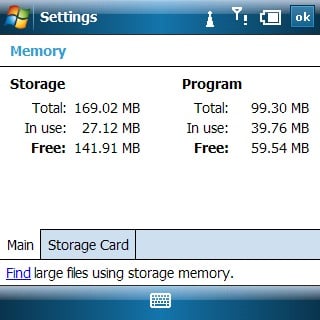
Let's run down the full specs with some commentary on each:
- Operating System: Windows Mobile 6.1 Pro. More on this below
- Chipset: MSM6800A +TI ARM1136 OMAP2430 running at 333MHz. I'll let somebody else (Hi Malatesta) get into the nerdy details of what the MSM chip here entails. For now, I'll just say this and explain more below: the 800w is snappy.
- Memory: 128 Program (DDR) and 256 ROM, of which 170ish is available to the user. It's pretty standard these days, but it's enough.
- Expansion: microSD. Supports microSDHC up to 8gb.
- Data: EVDO Rev A, WiFi compliant with 802.11b/g. All of the above are good stuff.
- Other Data: Bluetooth 2.0 is fully operable with all the acronymy goodness that implies. Infrared is present too, for you real estate agents out there.
- Battery: 1150 mAh, supposed to be good for 4 hours of talk time or 200 hours standby. This might actually be accurate, see more below.
- Screen: 320x320 resistive touchscreen, 1.74” tall (updated info) and supporting 65k colors. I still like it.
- Camera: 2.0 megapixels for 1600 x 1200 pixel shots. It's pretty good, a sight better than on the 700wx's camera. The interface for it is still the same. Here's a sample shot of a co-worker's cute-asplosion desk under typical office fluorescent lighting (click for full size)

Speed and Shortcuts
I've already mentioned that the 800w is easy to type-on with just one hand, but one of the key advantages to a Treo is that you can do damn near everything with just one hand. Compared to the Mogul, the Treo is not only faster, interface-wise, it's faster to navigate simply because you can get at everything on the device with your thumb.
You besides the Start, Calendar, and Mail key on the front face of the 800w, there's also the side button to configure. Additonally, you can map Opt+ buttons to applications as well, though (aggravatingly), you still have to hold Opt down in order to launch the secondary shortcut.
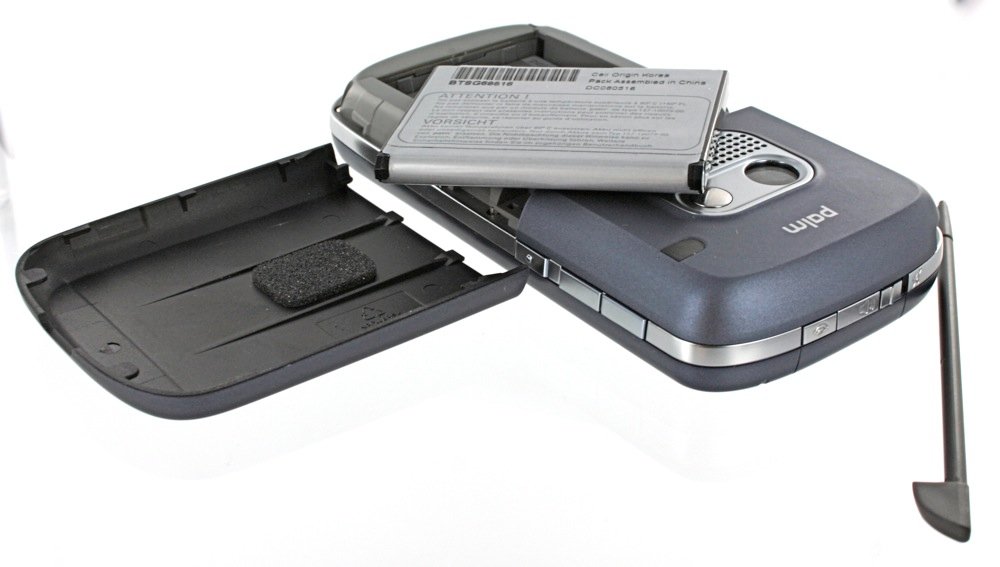
A bit more about that interface speed, though. The 800w is snappy. I wouldn't have expected it from the specs listed above, but the 800w is easily the fastest and most responsive Windows Mobile Pro device I've ever used; and I've used nearly all of them. In the WMExperts Podcast, Malatesta has been telling us all that Palm does quite a lot of optimization on Windows Mobile to make it perform better on lighter hardware. I can't speak to how much of that Palm may or may not have done here, but again: the 800w makes with the speedy.
The Touch Diamond may have TouchFLO 3D, the Sprint Touch may have TouchFLO 2. All the Treo 800w has is Palm's classic stuff: Photo speed dial on the Today Screen, custom threaded SMS, some smallish speakerphone and mute buttons on the call screen. The 800w, both on the screen and on the device itself, does not bring the pretty. But when it comes to running a fairly 'stock' Windows Mobile 6.1 Pro setup, it's wonderful device. Very little extra junk is included from Sprint, next to no lag, plenty of screen real-estate, one-handed operation... all of it makes the Treo 800w as utilitarian and powerful as its staid looks imply.
Data and WiFi
EVDO Rev A is fast. Wicked fast. I've had download speeds up to 850k, I'm averaging around 450 to 500k. That, my friends, is fast.
Of course, WiFi is included and it works darn well. I'll revisit the theme from above here: Palm has managed to work with the stock Windows Mobile defaults and make them easier to use. Here's the deal with the WiFi button:
WiFi Off: - Tap the button to turn on WiFi. If a network is in range that your phone recognizes, it will auto-connect - Hold the WiFi button down to just jump straight to the WiFi settings directly to pick your network.
WiFi On: - Tap the button to go to WiFi settings and choose your network. - Hold down the button to turn WiFi off.
...although there is a little strangeness to having the button's behavior flipped depending on whether or not WiFi is on, once you get it down it's very convenient. I was initially skeptical about Palm's choice of a button instead of a switch (like on the Mogul) for WiFi, but with the added ability to quickly access the WiFi settings I'm absolutely sold.
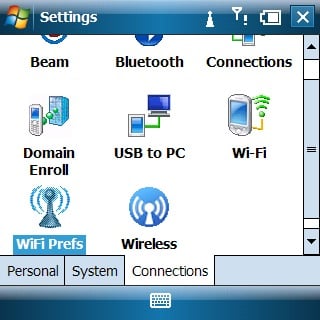
Additionally, there are other WiFi settings that are new to the 800w. Under WiFi Prefs in settings, you can turn on Power Saving mode to increase the 800w's battery life. You can also change the default “Always On” to “On button press,” which means the 800w will turn off WiFi when it detects that data hasn't been used for a set amount of time.
Given that the 800w has a tiny battery, the added power management features are welcome and should go a long way towards increasing battery life for average users and make managing WiFi easier for power users. Bravo.
Call Quality
Call quality on the 800w is so so. The voice quality is decent enough as is the speakerphone -- the gripe I have is that reception doesn't seem to be quite as good as the 700wx. It's very close and so I may just be making this up; but I've found that in my town, where Sprint's signal is just this side of unacceptable, the 800w seems to perform slightly worse, signal-wise, than the 700wx or the Mogul.
Battery Life
Palm and Sprint claim you'll be able to get either 4 hours of talktime (read: heavy use like talking, browsing, or GPS) or 200 hours of standby. In my testing so far that's a fairly accurate estimate, which is remarkable given that the 800w uses the same tiny 1150mAh battery found in the Centro. I need to do some more testing of a 'typical day' for me since I've been hitting it pretty hard, but right now I'm comfortable saying I get around 3.5 hours of heavy use off a single charge.
In other words, it should get regular users through a full day fairly easily, but power users will want to keep a close eye on power management. Given the fact that the 800w uses the same battery as the Centro, buying a backup battery is fairly easy to do and I recommend it. Actually, since Palm is selling to many Centros these days, they must have some pretty good economies of scale on those batteries, it would have been nice of them to include a 2nd one.
GPS
The 800w has built-in A-GPS (i.e the full standalone GPS that can also get extra assistance form towers) and Sprint has not locked it down at all -- it's fully available to any app that wants to access it. In my tests so far it's been able to pick up satellites in under 30 seconds with a clear view of the sky and can also perform moderately well indoors (which is to say I've managed to grab signal a couple of times).
Sprint Navigation (aka TeleNav) is on-board and included for free with simply everything plans (others must pay a monthly fee). On my test unit I wasn't able to get it going as it's tied to an email address not my own, but it's safe to assume that it works like TeleNav does on other devices; which is to say: it works very well for turn-by-turn directions and it's more convenient than TomTom in that it can name the streets you turning on.
“Maps”
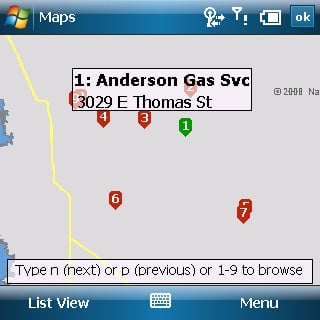
Palm has also included a mystery app called “Maps,” which we identified on WMExperts not too long ago because it has a plug-in for the Today Screen. You can search for services and things near your location or near another, not-where-you-presently-are location. The interface is a weird amalgam of Windows Mobile forms and something that smells a bit like a stripped-down version of Google Maps.
The folks I spoke to from Palm were frankly unclear about who developed the Maps application or what it's based on. It does integrate with Sprint Navigation/Telenav when you want to get driving directions, which is helpful, but a full-on, easy-to-use Maps application it is not.
The other only thing Maps has going for it is that Today Screen Plug-in and a default assumption that you want to search based on your current GPS location. Otherwise there's nothing that I can find Maps can to that the Live Search app (also included on-board) can't do better.
Maps stinks. Whatever development time was put into it would have been better served on something else--like developing a Today Screen plugin for either Live Search or Google Maps.
Windows Mobile 6.1 Professional
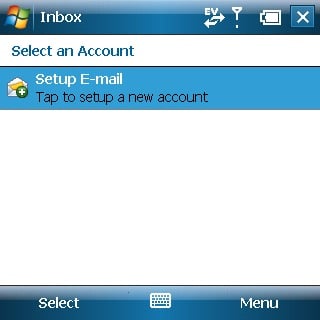
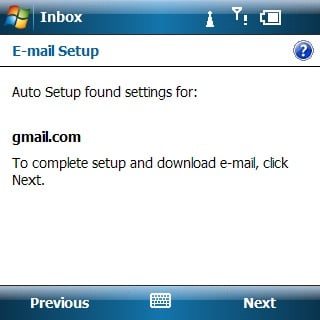

email in Windows Mobile 6.1
The Treo 800w is the first Windows Mobile Pro device to ship with version 6.1 standard. This is a big reason why Palm is pushing it as the ultimate business phone -- in addition to the speed and one-handed advantages mentioned above, it has built-in support for push email via ActiveSync and also for advanced enterprise device management features out of the box.
For the consumer, 6.1 may mean a little less, especially on the Treo 800w. Two of the main consumer-selling points on 6.1 were the addition of threaded SMS and a getting started guide. On the 800w, both are replaced with Palm versions and both are better for it. Palm's threaded SMS, although annoyingly not integrated into Outlook Mobile, is a better SMS system because it does a much better job of utilizing screen real estate.
(Oh yeah, as long as we're talking about SMS: No MMS here. Call Dan Hesse to complain and tell him we sent you.)
Palm also has their own custom getting started section which conveniently can point you to their online help sites, custom-formatted for the 800w. It's good stuff:
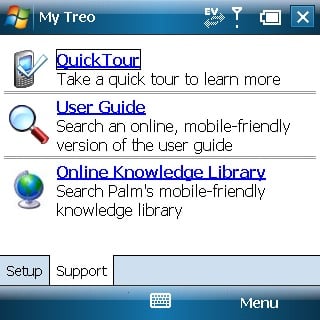
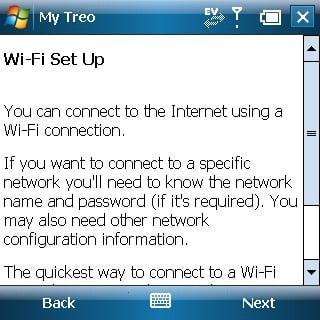
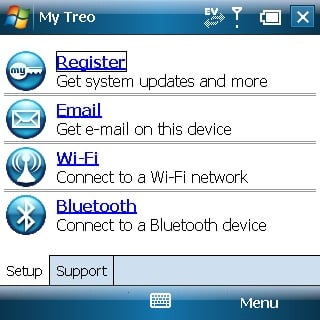
Another new feature that will benefit Treo 800w users is a slightly updated version of Pocket Internet Explorer. The main new feature is that it has a “zoom out” mode which lets you get an overview of the page. Although PIE doesn't do a great job on zoomed-in sections (although “Fit To Screen” mode works much better now, especially with a 320x320 screen), it does allow you to more quickly scroll through large pages and get to the section you want, which is convenient.
It's not out yet, but here's to hoping the speed and power of the 800w means that it will be able to run Opera Mobile 9.5 with nary a hitch.
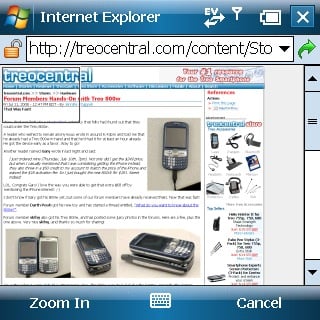
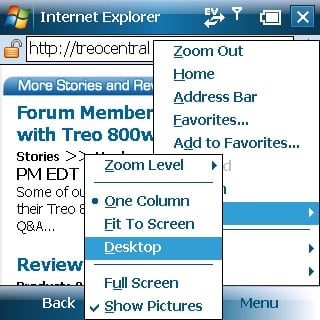
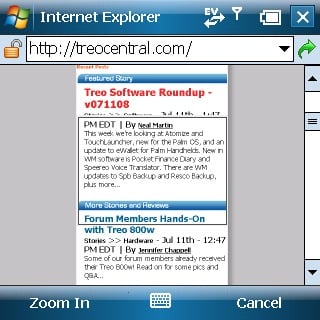
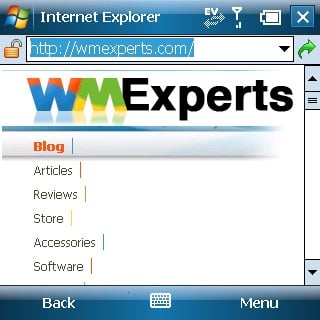
Internet Explorer on Windows Mobile 6.1
Otherwise the rest of Windows Mobile 6.1 is small improvements that don't jump out at you. Battery life (especially with ActiveSync) is improved, the Media Player doesn't require contstant re-scanning of the library, the Calendar has a nice overview “ribbon” (actually that was introduced in WM6), the Task Manager provides more information and is more user-friendly, and so on:
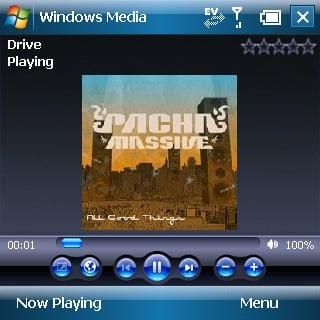
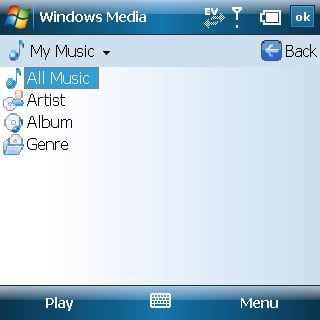
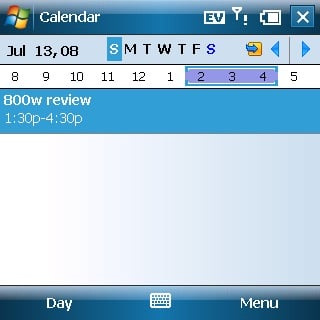
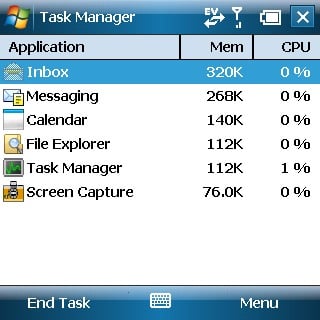
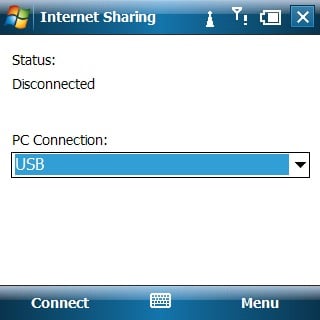
Note that last screenshot above -- that's full Internet Sharing and it's included, though Sprint does require that you have a full (and expensive) Phone-as-Modem plan in order to utilize it.
Included Applications
Let's run down the the included applications, with commentary:
- Office Mobile 6.1: Technically this isn't necessary for every Windows Mobile device, but it's pretty much expected. New is Office OneNote Mobile.
- My Treo: Links to Palm's online support
- Aces Texas Hold 'em and Astraware Sudoku: great to see some good games included.
- Oz Instant Messenger: the de facto multi-platform Instant Messenger Client.
- LiveSearch: I still adore this mapping and local search application
- PDF Viewer: Good to go.
- Pocket Express: A neat little app that gives you quick access to all sorts of mobile content like news, weather, sports, and more. It installs a few Today Screen plugins by default that some may find annoying. Also annoying is that you will need to pay for full functionality. A lot of people like this app, but I'm not one of them.
- Sprint Software Store: Yawner.
- Sprint Navigation: AKA Telenav
- Sprint TV: A great app for killing time, though again you will need to pay extra for some of the premium content
- Sprite Backup: Yep! Sprite Backup is included for free in the ROM! Good on Palm and Sprint for getting a great backup app built-in.
- Windows Live: Yep again! This is the full version of Windows Live, which gives you push email and contacts from Hotmail / Live Mail, a full MSN Messenger client, and some nice today screen plugins.
- Various Palm Enhancements: These include photo speed dial on the Today Screen, a slightly improved call screen with touchable speakerphone and mute buttons, and Palm's threaded SMS app.
All in all, a good set of included applications that you can use if you like or ignore if you don't. Again, Palm has done a great job of taking a “stock” Windows Mobile installation and keeping it fast and clean while still included some nice bonus software.
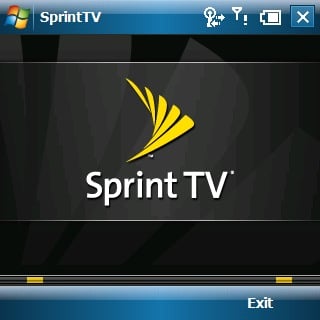
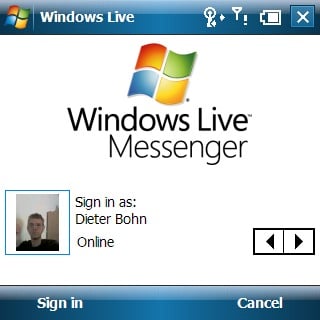
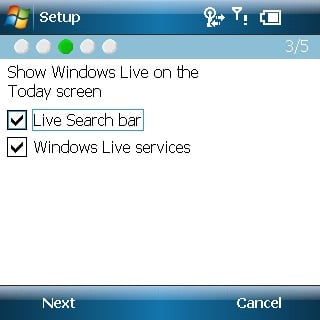
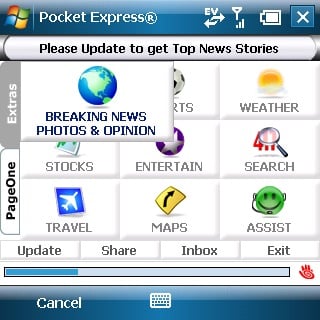
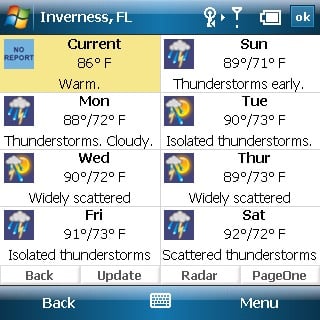
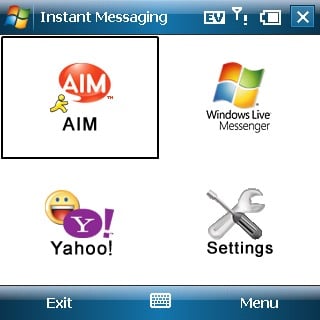
Comparisons
Here are some shots of the 800w up against other Sprint Windows Mobile smartphones. First up, the smartphone it replaces, the brick, the old dog, the antenna'd wonder, the Treo 700wx:
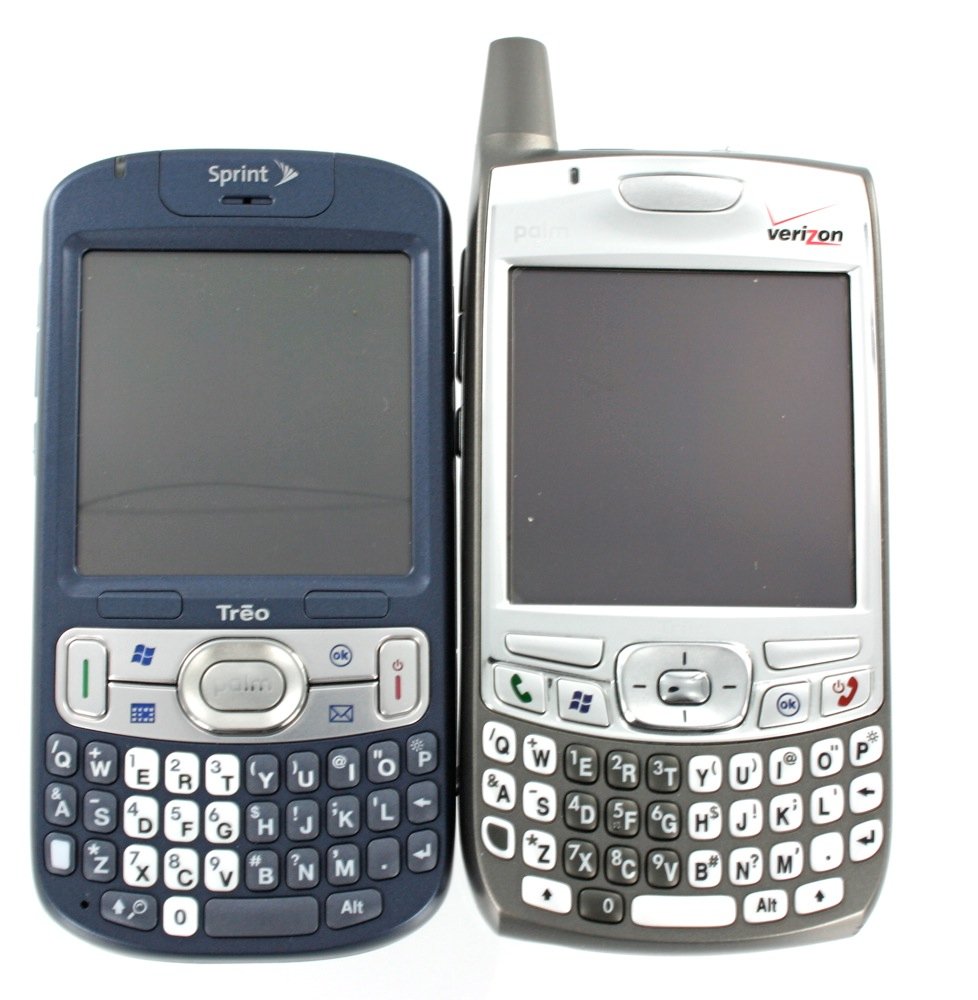
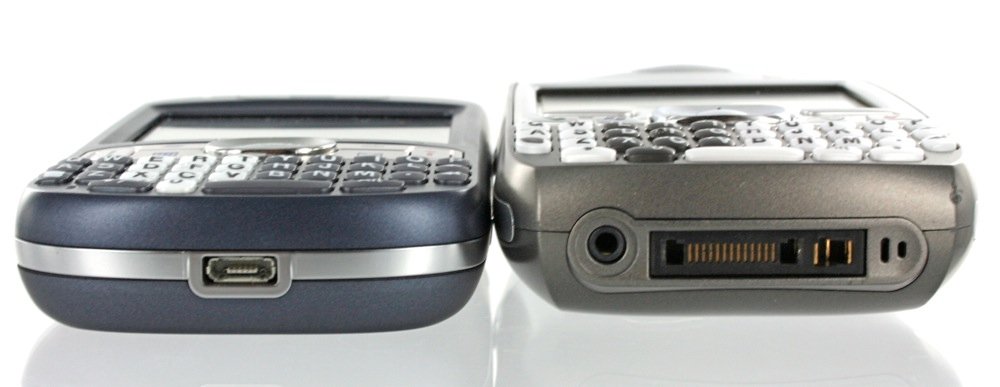
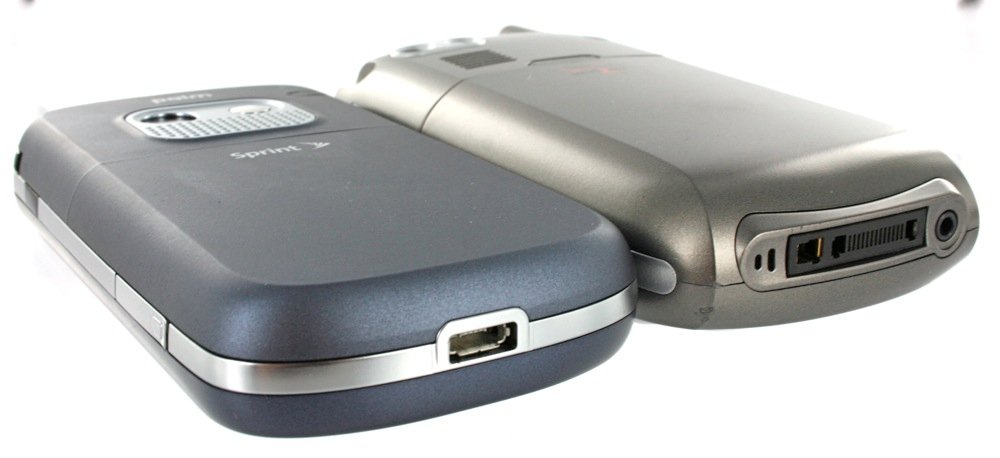
And here it is next to the Sprint Mogul. Unless you find the Treo's keyboard a little too cramped to type on, the Treo 800w beats the Mogul hands-down. Higher-resolution screen, slightly better performance, and one-handed usage all add up to the best Windows Mobile Pro device on Sprint's network.
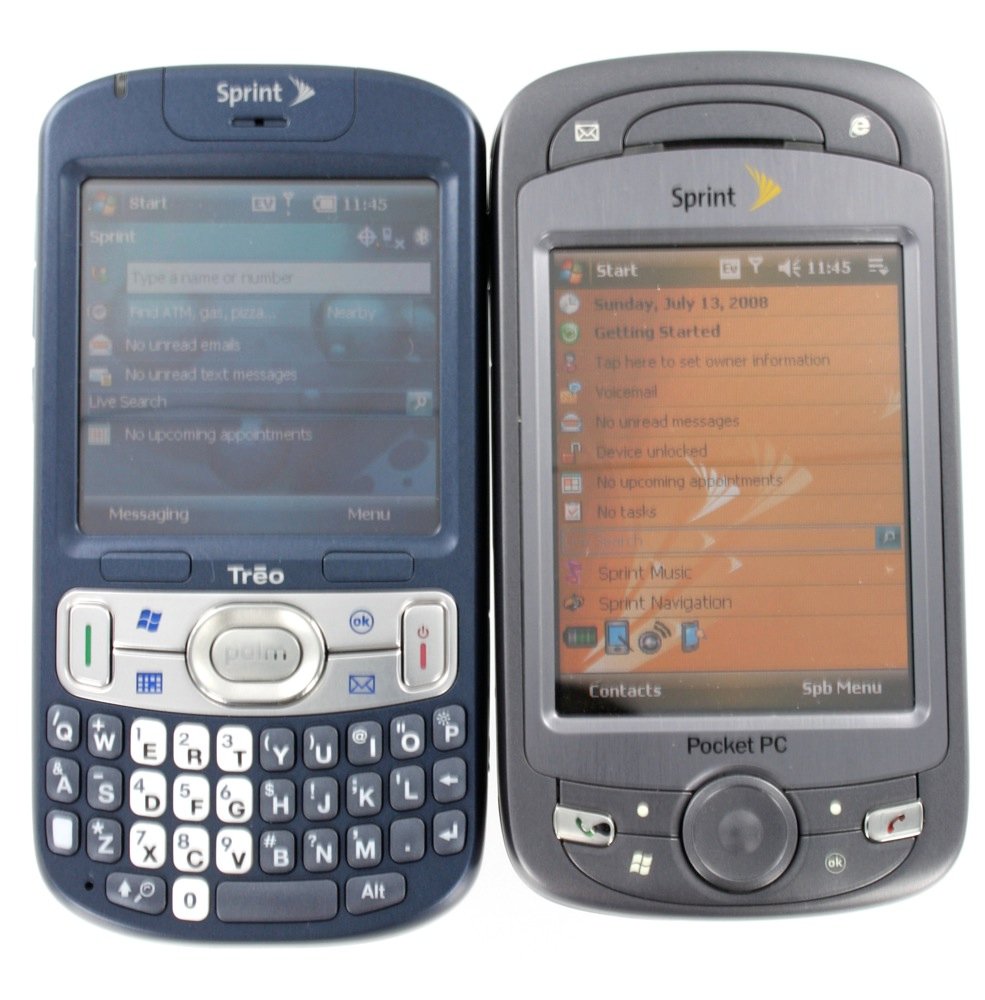
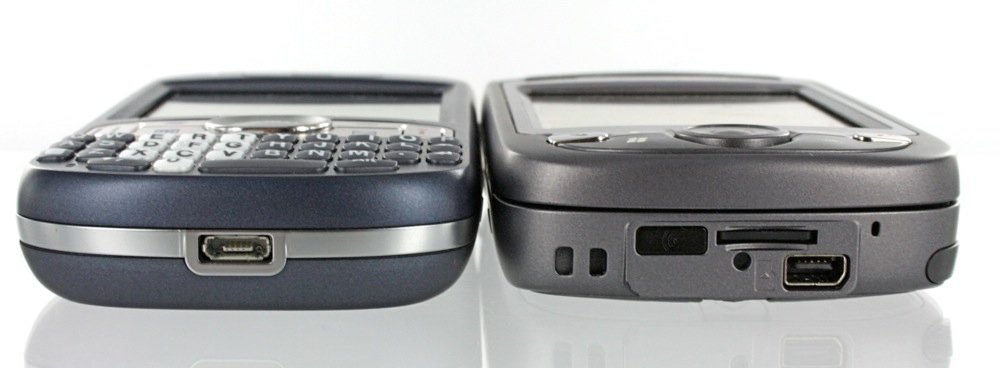

Here it is up against the Sprint Touch, note the “screen saver” mode that I mentioned earlier in the below shots:
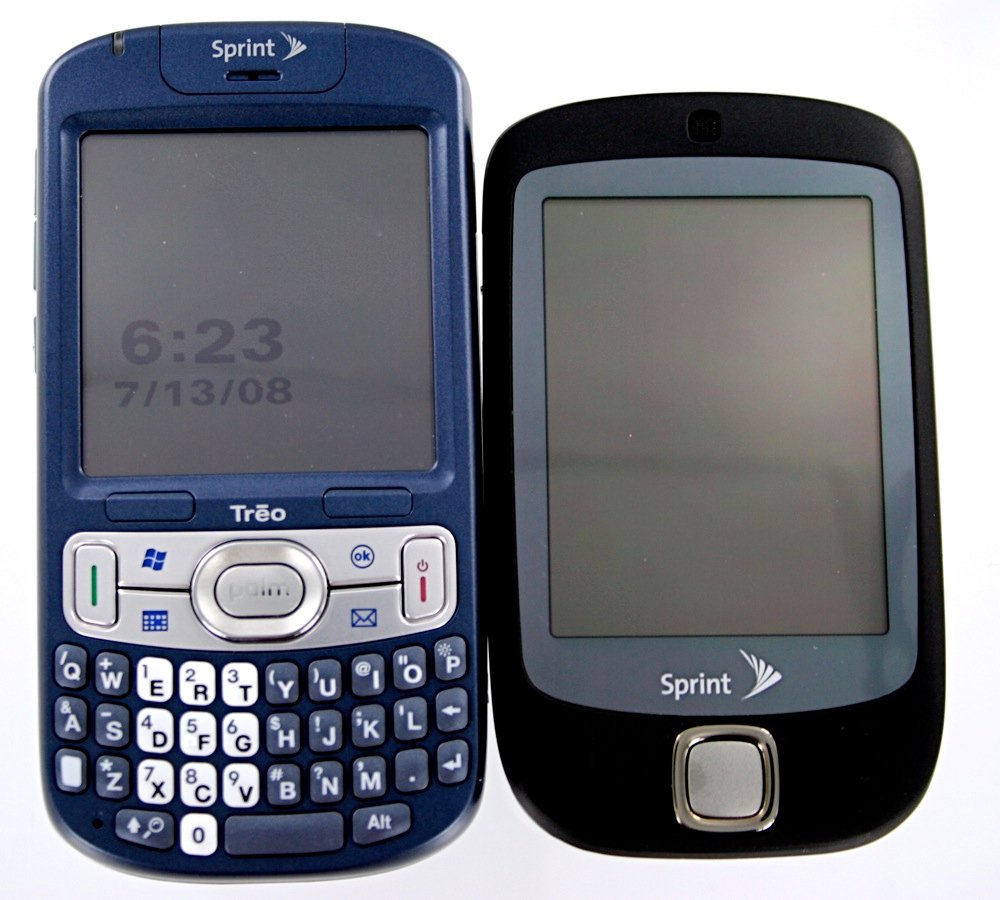
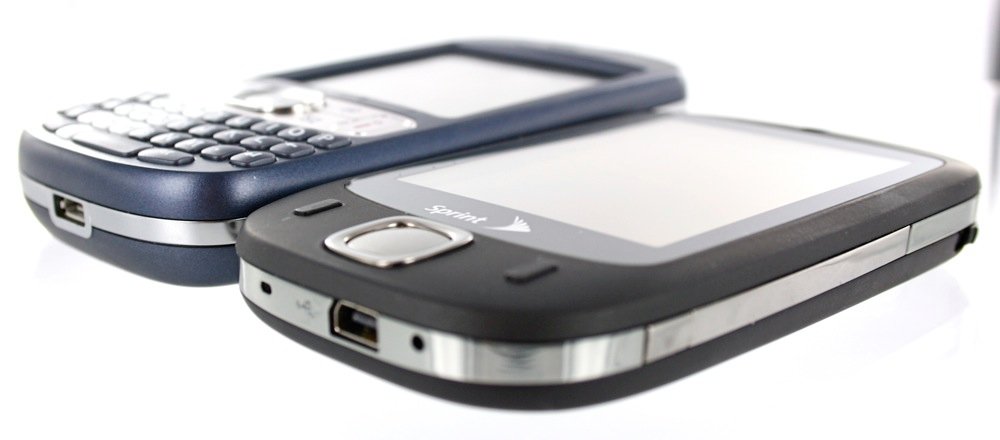
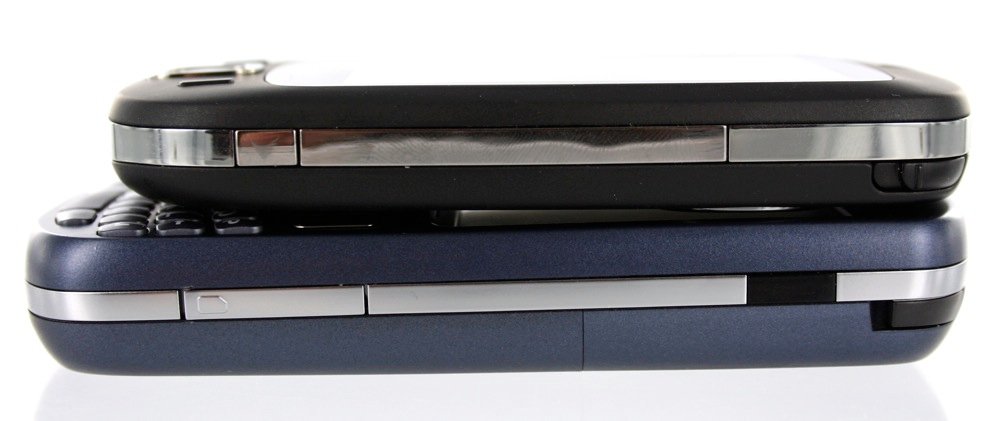
...and lastly up against the Samsung Ace:
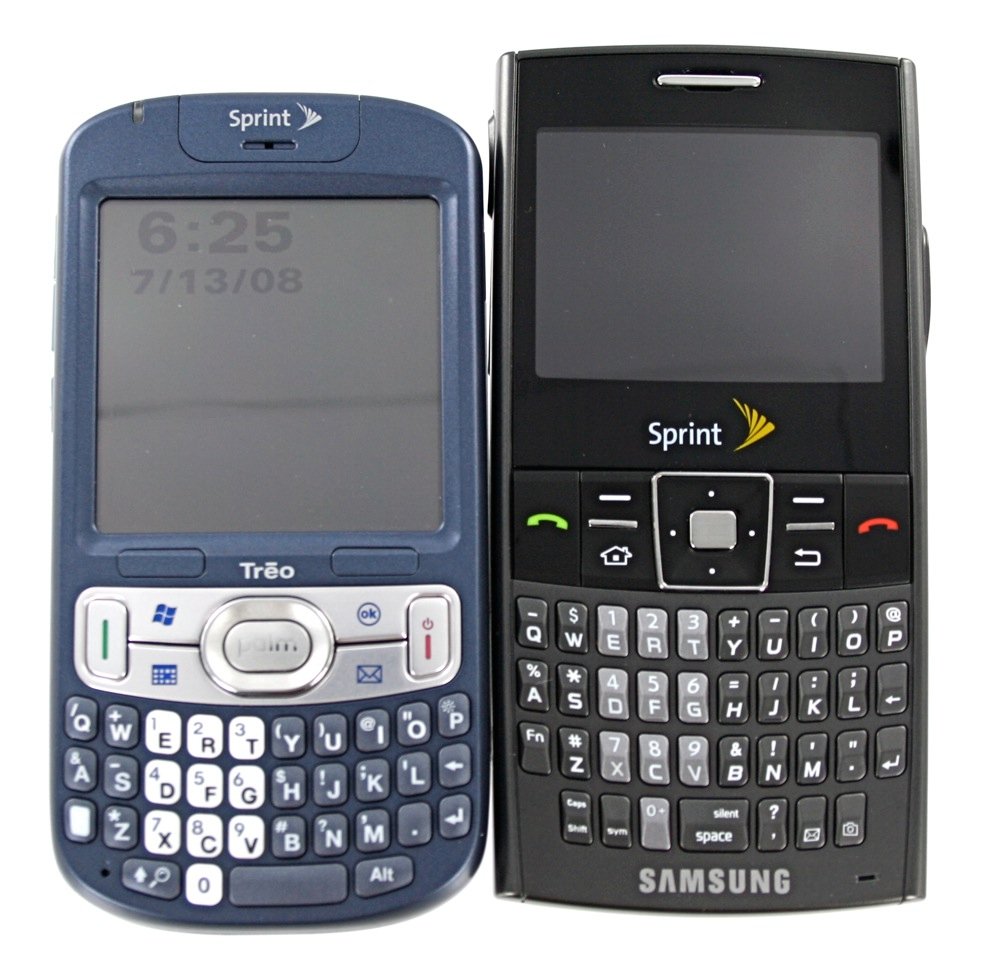
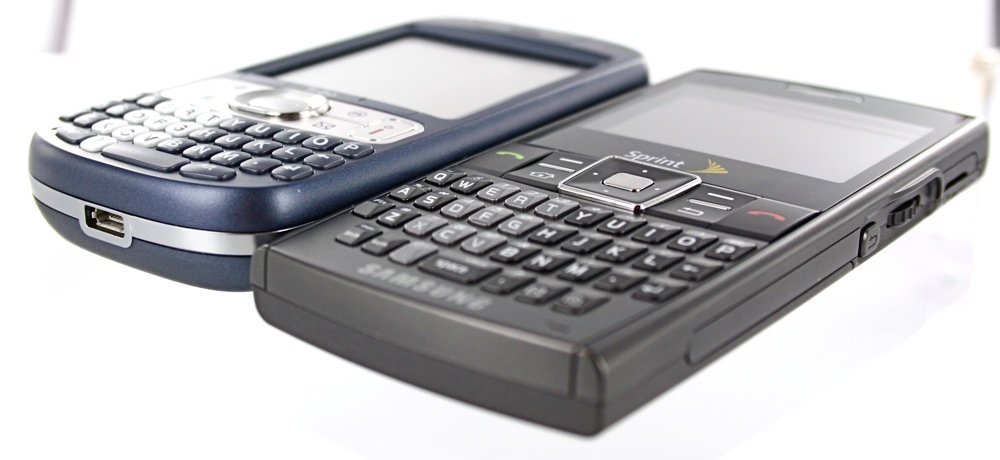
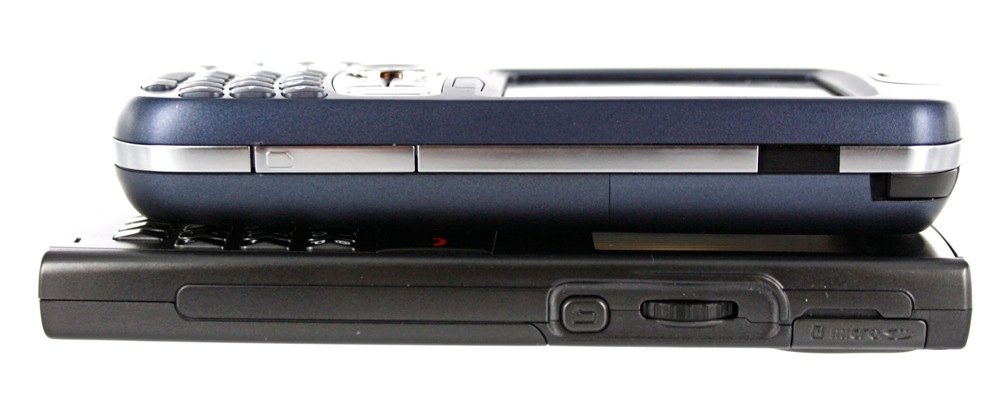
Conclusion

After all that, what's my final verdict on the Treo 800w? It's this: The Treo 800w is the best Treo ever. That shouldn't surprise anybody, it's the newest Treo and so it ought to beat out its predecessors. Here's the surprising part:
The Treo 800w is the the most productive Windows Mobile Pro device I've ever used.
If you need your phone to be shiny with lots of eye candy and other tomfoolery, the iPhone or the Touch Diamond are up your alley. If you need your phone to allow you to get work done, the 800w should be on your short list. It's very fast, well-integrated with the hardware, and has been bug free so far in my testing.
Given the state of the smartphone world today, I'm betting that many in the business set won't be getting the message about the Treo 800w, and that's a shame. It's more than competitive with the current generation of BlackBerrys (better, in my opinion) and even holds up fairly decently against the upcoming BlackBerry Bold (except, of course, in the looks department).
As for those of us who like to call ourselves “power users,” the 800w has enough speed and space to handle pretty much any app or customization you might want to throw at it. It's a worthy successor to the venerable Treo 700wx, I just wish that it had arrived a year ago.
| Ratings (out of 5)Hardware: 5Speed and Responsiveness: 5Battery Life: 3Connectivity: 5Overall: | ProsNice sizeFast, snappy, zippyGreat implementation of Windows Mobile 6.1 ProOne-handed UsageGPS + WiFiConsBattery LifeFlimsy StylusBoring looks |
Home to the most invested and passionate Microsoft fans, Windows Central is the next generation destination for news, reviews, advice and buying recommendations on the Windows, PC and Xbox ecosystems, following all products, apps, software, AI advancements, and accessories. We've been around for more than decade, and we take our jobs seriously. Windows Central writers and editors value accuracy and editorial independence in everything we do, never receiving compensation for coverage and never pulling punches.

